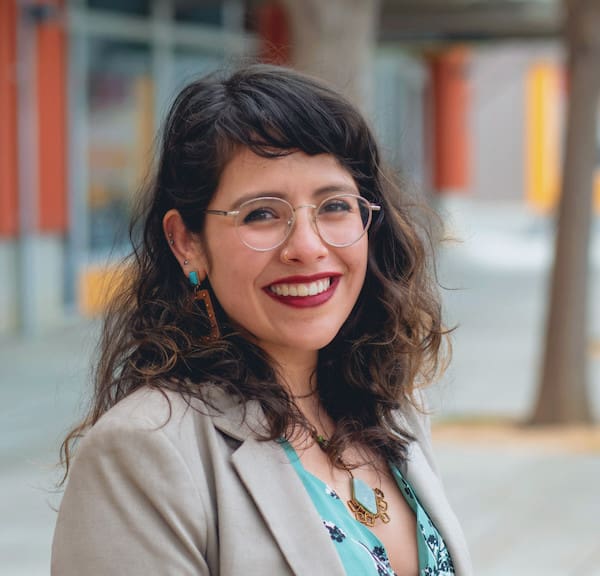By Ruth Rosas, Program Manager for America Walks

To read this piece in Spanish, click here.
I was born in Mexico but grew up in a rural town in Northern Illinois. In this small town, I walked to school, even in the winter, and delivered the local newspaper by bike. And in the summers, I played in front yards and backyards with kids from my block from morning to dusk. Although my neighborhood was very walkable, I felt embarrassed walking places.
My family stood out. We were visibly different. We speak Spanish, we have light brown skin and we were living in a town that was homogeneously white and English-speaking. I saw people walking on the weekends, on the main street, and near parks, but otherwise, most people depended on their vehicles. Many houses were spread out in between miles of cornfields and there weren’t any public transportation options, so people drove.
In my pueblo in Mexico, we walked everywhere. And I never considered walking to be embarrassing there. But in the U.S. when I didn’t see a majority of my peers walking to school, grocery store, library, or anywhere else, I became aware of other divisions in life besides language and skin color. I became aware of social class and culture. My family didn’t have any other options for transportation, so I continued walking and riding my bike and the embarrassment of being different continued.
For college, I moved to Chicago to study architecture. Chicago opened up my world to public transit and redlining. Because I was new to Chicago, I was warned by mostly-white people to stay away from certain neighborhoods because they were dangerous. One day, I had to go to a neighborhood I was warned about and what I found were people like me and restaurants full of food I was familiar with. It was then that I began to explore the deep divisions that bias, racism, and segregation created in Chicago.
My first ‘real’ job out of university paid so little that I started biking the 12 miles to work to save money on transportation. Soon, I started biking everywhere. But I noticed the way people talked about people on bikes, pedestrians, and those on public transit, often equating the lack of a car with the lack of wealth. This brought back those memories of isolation and embarrassment that I felt walking to school in my small, rural town. Nonetheless, not owning a car felt like economic freedom and I leaned into biking and dove into the world of active transportation. And at the age of 22, I began to learn the language of transportation advocacy. Now, the majority of my adult life has been spent using my voice to advocate for safe streets for marginalized communities. But it hasn’t been an easy journey.
When I found myself sitting at community tables with advocates and professionals discussing transportation issues across our communities, their stories did not reflect my own. In fact, stories like mine were stereotyped, misunderstood, or worst of all, forgotten. I didn’t need an incentive to walk, bike, or take public transit. I traveled that way out of necessity. It was difficult to find spaces that wanted to draw upon a multitude of perspectives and consider how the built environment affected different people.
But the lack of engagement and representation aren’t the main issues. Instead, they point to larger racial and wealth disparities that exist and the lack of power that communities are given. Because the transportation system dictates who has or doesn’t have accessibility and opportunities to resources, transportation shapes almost every part of everyone’s lives. In my work, I am determined to support people from marginalized communities in transportation spaces. Time and again I have felt silenced in my concerns and my story was made to feel insignificant.
But with time, I learned the language and found my voice in transportation advocacy. It has been by lived experiences and by mobility justice leaders like Dr. Adonia Lugo who has written about the role of mobility and racial justice for years, Naomi Doerner who was one of the first people I heard speak about equity in transportation, and countless others who have advocated for those who have been invisibilized. Now with Latino Advocacy Week starting, I am reminded there is power in unity, community, and catalyzing change by bringing new voices into these spaces. It is important to continue fostering advocacy skills in communities that have been intentionally or unintentionally left out.
I am happy to be joining America Walks, raising awareness, organizing for change, and advocating with communities whose voices and power have been suppressed and minimized. Through this work, America Walks will start to provide Spanish language resources to ensure that communities like mine have access to knowledge and can be included in conversations to advocate for change. I’m incredibly enthusiastic about this work and look forward to seeing you out there in our common work for change.
Read more about Ruth here.